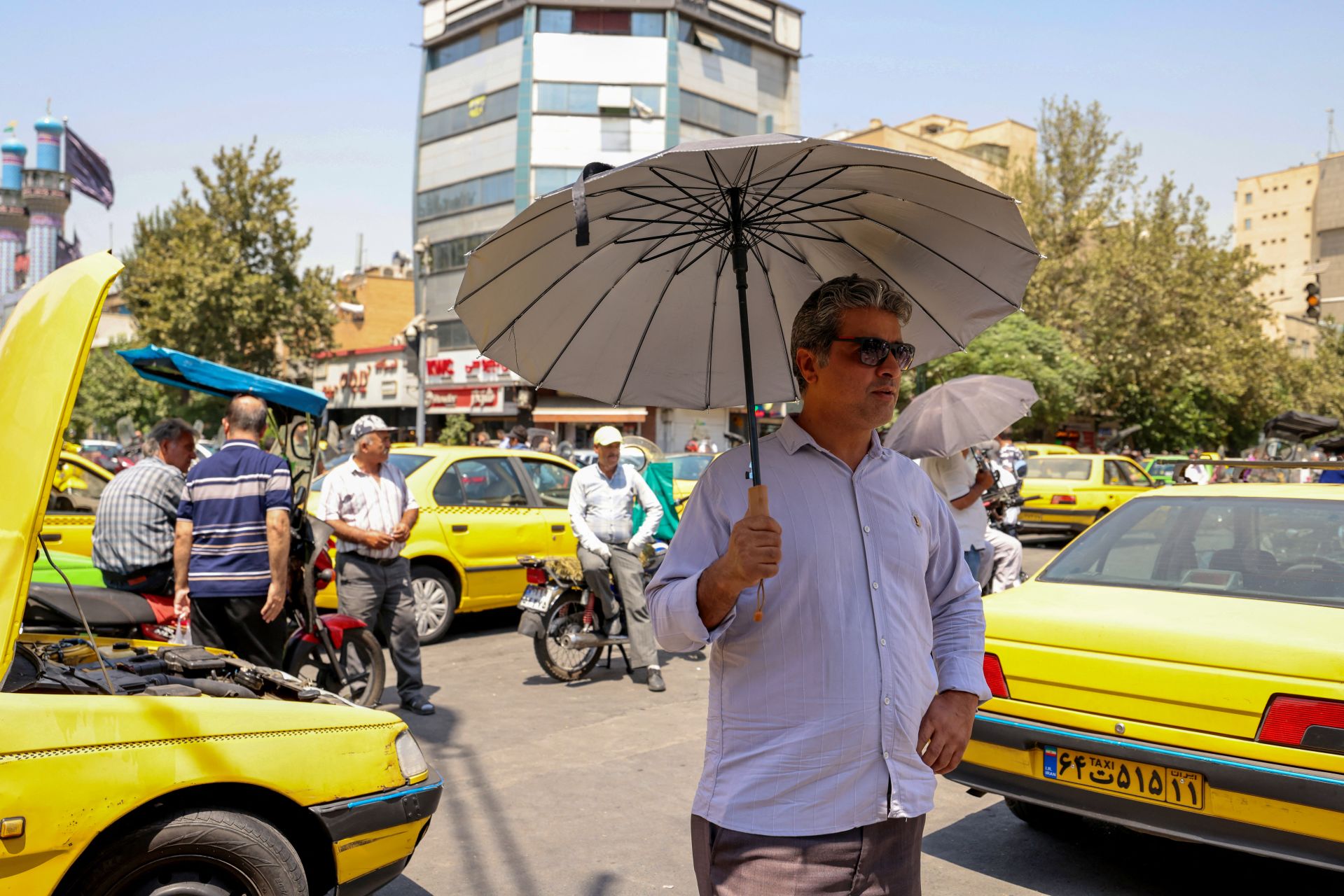- Home
- Middle East
- Iran’s GPS Jamming Hits Daily Life, Leaving Drivers Lost in Tehran

Iranians use umbrellas to shield themselves from the sun, as they walk on a street during a heatwave in the capital Tehran on August 9, 2025. ©Atta Kenare / AFP
The streets of Tehran have become a confusing maze for driver Farshad Fooladi amid widespread GPS disruption, still ongoing nearly two months after the end of Iran and Israel's unprecedented 12-day war.
"For weeks I have been unable to work," said Fooladi, who uses Iran's homegrown ride-hailing app Snapp to find customers. "Most of the time was wasted wandering around aimlessly," the 35-year-old Iranian driver added.
Unprecedented disruption has plagued users of GPS, which stands for Global Positioning System, in Iran since Israel's surprise attack in mid-June, which triggered a deadly 12-day war.
Iran's communications ministry has said the disruptions were necessary for "security and military purposes," without giving further explanation.
Missiles, drones, and rockets often use GPS or other similar technologies, which involve triangulating signals from multiple satellites, to find their targets.
Iran has long employed GPS jamming and spoofing around sensitive military sites, but the recent disruptions have been the most sustained and widespread.
It remains unclear how long the measures will last or how much damage they have caused to Iranian businesses.
Ride-hailing apps, delivery platforms, and even basic mapping services like Google Maps and its Iranian equivalent, Neshan, have buckled under the interference.
In many areas, especially around Tehran, users often spot themselves on the maps hundreds of kilometers away from their actual locations.
"To get around, you either need a sharp memory for routes or already know the city well," Fooladi said.
But the driver, originally from the western Lorestan province and less familiar with the capital's winding backstreets, frequently finds himself running into dead ends.
"I only pick up passengers who know the directions," he said, adding the strategy had severely cut his income.
“Collateral Damage”
In early August, the chief executive of the Neshan mapping app, Javad Amel, said in a video interview that daily disruptions through GPS spoofing had been ongoing for years, especially in Tehran.
But he explained in recent weeks that Neshan's daily active users "had dropped by 15 percent, while navigation activity on the app fell by 20 percent".
The continued disruption has heightened fears of a deepening economic crisis among Iranians.
The Islamic republic's economy is already struggling under the weight of decades of international sanctions and mismanagement, compounded by the revival of US President Donald Trump's "maximum pressure" campaign earlier this year.
Nuclear talks with Washington, which began in April, have also stalled since the United States joined its ally Israel to strike Iranian nuclear sites in June.
"This war has upended our lives and frozen our future plans," said Fooladi.
In a report last week, the Khabar Online news agency warned against the disruption of GPS, saying it caused "collateral damage" to the digital economy and public safety, including delays to emergency services.
Former communications minister Mohammad Javad Azari Jahromi argued the disruption was costly and would likely have limited defensive results.
"Drone manufacturers and operators are not stupid either. If the GPS is disrupted and another positioning system replaces it, they will also use the new system," Jahromi said, according to his Telegram channel.
“Unclear Future”
With the significant impact on civilian lives, deputy communications minister Ehsan Chitsaz suggested that Iran could consider alternatives to GPS.
"Disruptions are created by domestic systems on GPS, and this has pushed us toward alternative options such as BeiDou," he told Iranian daily Ham Mihan in July.
The Chinese satellite system BeiDou, fully operational since 2020, is emerging as a global rival to the US-built and operated GPS.
Chitsaz said Iran was "drafting a program" so some of the country's location-based services for transport and agriculture could "gradually migrate from GPS to BeiDou."
He acknowledged disruptions in Iran, coupled with years-long internet restrictions, have damaged businesses and created "social distrust and despair."
But experts say that replacing GPS would be complex.
"Doing so would require extensive and costly infrastructure changes," said Amir Rashidi of the US-based Miaan group, adding that Iran is currently "highly vulnerable in cyberspace."
Many in Iran believe that another confrontation with Israel is on the horizon as Israel and the United States continue to threaten attacks if Iran restarts its nuclear programme, which has been on hold since the war.
"Everything is uncertain, and we can't plan. The future is unclear," said Mohammad Hossein Ghanbari, a 32-year-old Snapp driver.
"We don't know whether the war will break out again or what will happen next."
Ramin Khanizadeh, Menna Zaki / AFP
Read more



Comments